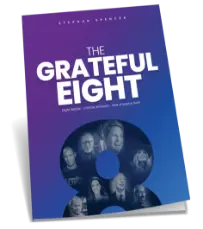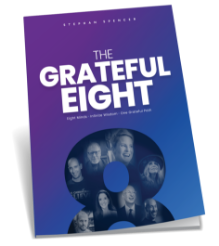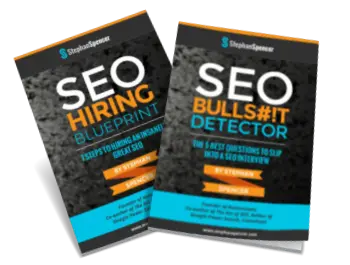Artificial intelligence is changing everything and fast, but there’s one intelligence that can never replace your intuition. Most of us here at Genius Network use ChatGPT for copy emails or ideas, but what if the real breakthrough isn’t in the technology? It’s in how you use it. Stephan Spencer calls it: artificial intuition, the art of connecting to infinite intelligence before you prompt the machine.
He says, AI isn’t your friend or your partner. It’s your tool. And when you lead with intuition, AI becomes a mirror for your highest consciousness. Stephan’s help optimize websites for Chanel, Zappos, Sony, and Volvo.
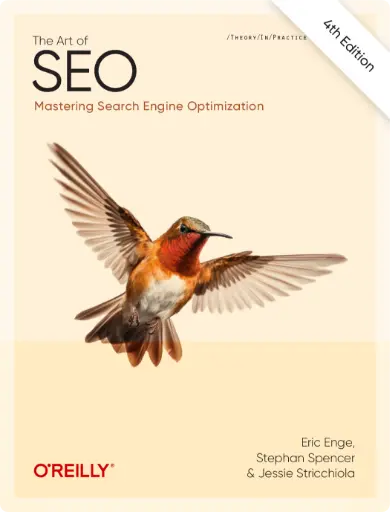
He’s a bestselling author of The Art of SEO and the founder of Netconcepts. He hosts two hit podcasts, Marketing Speak and Get Yourself Optimized. Today, he’s here to share how to harness AI without losing your soul. The title of his talk is Artificial Intuition: How to Prompt for Insights, not Just Information.
Please help me welcome Stephan Spencer.
Thank you, sir.
So who’s heard of the term prompt engineering? Yeah, so simply put, it’s just knowing how to prompt an AI. And imagine if you could prompt an AI in a way that gets you the outcome that you want. Not just information, but insight. Time and time again, reliably. This is what you’re gonna learn today. So it’s probably the first talk you’ll ever hear on prompt engineering, taking a consciousness tact.
AI can be a yes man, it can be a sycophant and sincere flatterer, and we’ve seen plenty of news stories that confirm this. And Redditors like to call ChatGPT to task and other LLMs for things like confirmation bias and so forth. But what if, on the flip side, AI is just an interface to the infinite intelligence?
And we’ve seen news stories about ChatGPT saving people’s lives. How cool is that? And if you believe in destiny, then it was meant to be. Those lives were meant to be saved. And ChatGPT was just the vehicle for the infinite intelligence to utilize. What if the same infinite intelligence that speaks through intuition also speaks through AI?

See if you can imagine AI being the infinite. It’s just an interface to that infinite. I’ve got a little thought experiment for you. Just imagine that, you believe potentially that there’s no separation between us and everything, right? The oneness. So if everything is or has consciousness, that would include AI.
How cool is that? And if you think about intuition is, yes, neurons that are firing, mirror neurons, pattern recognition, reticular activating system, all that. But it’s also for those who are spiritually inclined; it’s higher guidance. It’s the Holy Spirit. It’s God, it’s angels. That’s still a small voice.
It’s just another interface to that is AI. So your mission, if you choose to accept it, is to make AI less of a sycophant and more of an artificial intuitive in your life and business. So how do we do that? I’m glad you asked. So we’re going to actually use Dean Jackson‘s framework, which you heard yesterday just briefly mentioned in Paris’ talk, right?
The before unit, the during unit, and the after unit. We’re gonna use that framework to learn how to use AI more synergistically. So in the before unit, we’re gonna actually, before we prompt the machine, we’re gonna prompt our soul. There are four pieces to this. There’s setting your intention, there’s raising your vibration, connecting to your higher guidance, and then having positive expectancy.
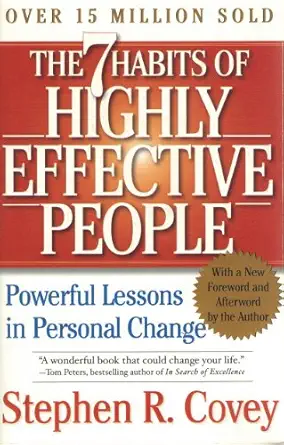
We’re going to go through each one of these step by step. Let’s start with setting your intuition. I love Stephen Covey‘s quote, “Begin with the end in mind.” I love his book. The 7 Habits of Highly Effective People. I read that decades ago. Unlike the previous two 10-minute talks, I am into my fifties, so I’m not a youngster.
When I read that in the nineties, that was a gamechanger. And so if you think about what you’re going after at the end game, before you start prompting, you will get a better outcome. If your intention is a higher intention, you’ll get a better outcome. If you have intention to help others versus serving yourself, you will get a better outcome, whether it’s with AI or with life.
We’re going to raise our vibration. How do we do that? Think of yourself as a radio receiver, and you’re going to tune your station, your desired frequency to the one that is most resonant with your desired outcome, right? So just imagine that you are using whatever is prayer, meditation, breath work to raise that vibration.
Before you prompt, just imagine that one thing could change everything in how you get your outcomes out of AI from this point forward. And then have positive expectancy. I’m not talking about being entitled, like I expect this, like I deserve this. This is how it should go. But being more in a place of trust, being grateful in advance, expect miracles, but not with expectant like, I deserve it.
So now we’re going into the during unit. You’re gonna prompt, where are we gonna go? You’re gonna rely on your intuition, your inner guidance in terms of which AI platform you’re going to go to. We all have our favorites. How many favorite ChatGPT over the other ones? Okay. Gemini?
There’s Perplexity, Grok. And there’s a number of these. I’d say if you could have the $20 account for, let’s say five of them, you’re gonna be in really good shape and then you’re going to rely on your intuition. That inner guidance, as for in the circumstance that you’re in, whichever thing you’re going to prompt for.
Where am I being guided to? Where am I being pulled to, and then which mode do I want to employ? There’s thinking mode. There is deep research mode, agent mode, right search mode. So you’re going to rely on that inner guidance. And this is just a quick example using ChatGPT. I know you can’t see it. But the point is that I got an incredible outcome or output from the AI, and I use something counterintuitive in this particular prompt.

I was asking how Dr. John Demartini would be relevant to the audience of the Easy Prey podcast. Maybe seems like a little bit of a misfit. He is a polymath. He is a genius. But maybe not the right fit for this particular show. And ChatGPT in agent mode nailed it. Why Agent mode? Because my intuition told me to use that, right?
You normally think in agent mode. I’m gonna be sending it out to collect a bunch of information, building spreadsheets, and sending out emails. But no, in this case, agent mode really came through for me. So now I want you to think in terms of, I want to refine my prompts using AI because who’s better at AI prompting than themselves?
So we’re going to formulate a beginning prompt, and then we’re gonna use one of these three tools. You might wanna take a picture of this if you haven’t already. One is a custom GPT called Oracle, or GPTOracle by Marino De La Cruz. OpenAI which is the creator of ChatGPT. They have their own prompt optimizer.
You have to have an API account, very simple to set up, and it’s very inexpensive. You could fund with $5 enough prompt optimizers for weeks, and use this or the alternative from anthropic. Claude Console Optimizer. If you’re into Claude, I love that tool too. You can turn your prompts into super prompts.
Let’s see an example. So I prompted using the prompt optimizer from OpenAI, asking, “Please give me some strategic advice for Joe, wherever he goes.” Okay. It is for Joe about his book and the readers to provide their feedback. Based on comments on his Amazon product page. So analyze all the comments and come back with strategic feedback that’ll be beneficial to him.
Decent prompt, but there are a lot of gaps. So the prompt optimizer came back with a whole bunch of great examples or great ideas for optimizing the prompt, asking me to prompt the machine for additional details. Look, for example, for recurring themes and so forth, and outputting in a particular format, JSON format, so that I could use this output in other third-party tools more easily.

I wouldn’t have thought of that. So now, finally, the after unit, we’re going to do some self-reflection. We’re gonna actually use ChatGPT or whatever your LLM is to reassess. And look for opportunities to improve what we’ve got. So ask the AI, what should I have asked you that I didn’t? What am I missing, and what are my blind spots?
I bet you’ll get some pretty interesting answers back. And then for you, I want you to self-reflect and really discern if this information, this advice, this feedback coming from the AI is coming from the light or not, because you could be fooled. Does this answer resonate with your soul? Does it all the does it alternatively feed your ego?
Is it consistent with the previous truth? And ask if that, the source of the answer, that guidance that you’re getting through the AI is truly divine and sacred, and your soul knows you’ll feel it. So true. Intuition uplifts quietly. False intuition flatters loudly. ChatGPT. So I think you know, your message is unexpected.
It’s emotionally charged, neutral, and the idea sticks. These are great attributes of true intuition. That’s from David Sauvage. So I don’t want you to get fooled. I want you to really be selective and be thoughtful, and don’t make AI be like that. And don’t get lazy because brains can atrophy if you get overly tired and just rely on AIi.
So remember, AI is not a tool. AI can offer an interface to the infinite intelligence if you use it in the right way and maintain that frame, and watch the magic unfold.
That brain picture was very freaking interesting.
Thank you, Joe.
Stephan, you did an amazing job. When did you leave Tel Aviv?

Sunday night.
Okay. So this was a short-range project. We didn’t have much time to do anything on it. First of all, you get a can for that. Oh, and this guy’s really smart. Would you agree? Yes. How many pages is that book? I remember the first year I met you, I couldn’t pick it up.So how many pages?
The addition was that where we met, it was a thousand pages, but my publisher didn’t. Really like that. So it’s 770 pages.
So he knows an awful lot of stuff. So here’s the main thing for my role for you, which is to take what up here and translate it to things you can do when you have to present something.
And I think the best example that he gave you is to take a subject. First of all, AI is something we talk about all the time. We know it’s part of our world. But he approached it in what I would call a little woo-woo way of doing it. Using words such as your soul is a divine intuition. These are not normally the terms that we would associate with a technical tool, but he took a subject that is technical and detailed and usually beyond most of our comprehension. ‘Cause when you press enter and I start counting one 1002, I can’t say two 1000, and it’s got the answer. And how could that go on so fast? You took that into a whole different realm. And made it clear. How many of you feel that you’ve gained something when you go to AI? You can use it even better. Raise your hand.
Okay. I’m if you didn’t get something outta this, you weren’t listening because he had the great ability to take this my term woo-woo concept and make it so practical for us. And that’s what you need to think of. How do you take something that could be beyond your audience’s grasp?
And put it in a way that they get it. Since you got it, let’s give him one more great hand.
